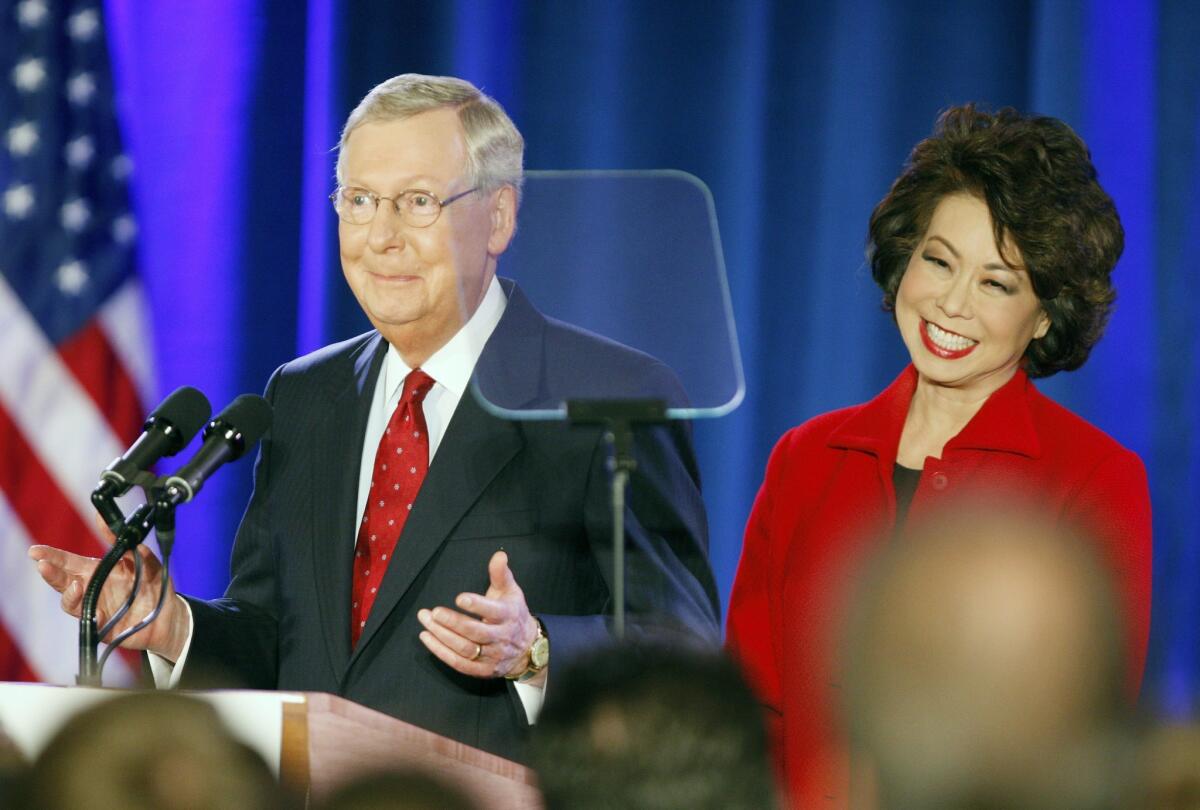Column: A new GOP mandate?

- Share via
How many victories add up to a mandate?
That’s a question Republicans and Democrats will be debating in coming days, as the GOP makes the case that its election victories add up not only to an electoral wave, but to a mandate — a genuine endorsement of conservative policies — while Democrats cast them as something less.
Charlie Cook, dean of Washington’s election analysts, has offered a sensible test for a wave: You have to look not only at how many seats the winning party captures, he says, but also at where they are.
Six of the Senate seats Democrats were defending in this election were in deeply conservative states that Mitt Romney carried by big margins in 2012, Cook noted. When Republicans win those states — states such as Arkansas and South Dakota — “that’s not a wave election,” he said. “That’s a map election.”
When the GOP wins Senate seats in swing states like Colorado, North Carolina and Iowa, as it did on Tuesday, that clearly adds up to a rightward shift — a wave.
But for a tidal wave, Republicans needed an upset or two, a surprise victory in a Democratic state. Earlier this year, they hoped that might be possible in Minnesota or Michigan. It didn’t happen. Nor did the GOP take swing-state New Hampshire, where Sen. Jeanne Shaheen apparently held on to her seat.
So this year’s GOP surge was more than a ripple, but not quite a tsunami. And that makes it a little harder to understand exactly what voters were trying to say. Were they handing Sen. Mitch McConnell (R-Ky.) and his colleagues a mandate to repeal Obama’s healthcare law, slash the federal budget and reduce federal taxes? Or were they expressing a more general dissatisfaction with the status quo?
Some conservatives were claiming a mandate even before the polls opened.
“The Republican Party’s going to have one of the most important, biggest mandates I can recall a party ever having,” radio host Rush Limbaugh forecast Monday. “It is going to have won for one reason: to stop Obama. That is their mandate.”
It was clear that many of Tuesday’s voters were unhappy with Obama. In a national exit poll, 65% said they thought the country was “on the wrong track” — an even higher percentage than gave that answer in the last Republican wave election of 2010.
A solid majority, 54%, said they disapproved of President Obama’s job performance. And many — although not a majority — said they intended their vote to express opposition to Obama’s policies.
But here’s a complicating factor: Most voters didn’t approve of the GOP leadership, either. A Pew Research Center poll last month found that likely voters disliked the Republican Party even more than they disliked the Democrats. A record high number, 68%, said they’d like to fire every incumbent in Congress, regardless of party.
Some endorsement.
As for a mandate, there was little evidence that voters were backing a specific conservative agenda. How could they? The GOP never really offered one. There was nothing resembling the Republican “Contract with America,” say, that Newt Gingrich offered in 1994, or even the less ambitious “Pledge to America” that House Speaker John A. Boehner (R-Ohio) offered in 2010.
Instead, most Republican candidates just emphasized their opposition to Obama, their determination to support small businesses and reduce regulation, and — to varying degrees — their desire to repeal, replace or at least reform Obama’s healthcare plan.
But don’t take it from me; plenty of Republicans said they were dissatisfied with their party’s failure to propose a more substantive governing agenda.
“Opposing Obama is only half the equation,” said David Winston, a Boehner advisor. Republicans, he said, did less well when it came to “telling voters what they’ll get with a Republican majority.”
And conservative blogger Erick Erickson worried that “Republican strategists [offered] no agenda other than ‘We are not Barack Obama.’”
How, then, can the GOP claim a mandate?
In truth, American voters rarely grant either party a full-blown mandate to pursue its wish list. Obama interpreted his 2008 presidential victory as a mandate for change, and then two years later, tea party Republicans insisted their victories in the 2010 congressional election constituted a mandate for conservative governance.
If the victorious Republicans are smart — and many of them are — they will recognize that what they won on Tuesday wasn’t a mandate; it was an opportunity.
Most voters have actually been pretty clear about what they want: They want to see their federal government get something done. In a closely divided Senate, that requires across-the-aisle compromises — not the full-blown conservatism that the GOP base yearns for.
But that’s Mitch McConnell’s problem now. So it was noteworthy, in his victory speech Tuesday, that the presumptive Senate majority leader never uttered the word “mandate.” Instead, he offered what sounded like an intriguing offer to negotiate: “Just because we have a two-party system doesn’t mean we have to be in perpetual conflict,” he said.
Twitter: @DoyleMcManus
More to Read
Sign up for Essential California
The most important California stories and recommendations in your inbox every morning.
You may occasionally receive promotional content from the Los Angeles Times.











